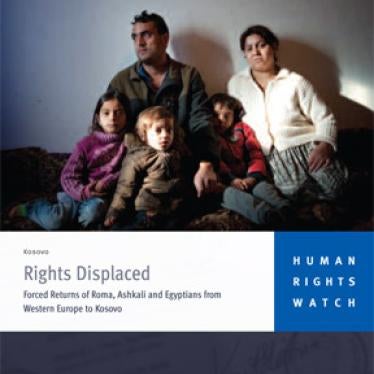With Brussels increasingly the most influential actor in Kosovo, the European Commission annual progress report is a key benchmark for its performance on human rights.
The latest report, published yesterday, rightly highlights the ongoing weakness of Kosovo's justice system (for which the EU's police and justice mission has particular responsibility.) It also addresses inadequate attention to war crimes, continued threats to independent journalists, slow progress on missing persons, and the widespread discrimination and marginalization of the Roma, Ashkali and Egyptian communities.
The report reflects many of Human Rights Watch's concerns. But in one area, our assessment differs starkly from the Commission's: Kosovo's compliance with EU standards for migration, asylum and border control.
The progress report's assessment is upbeat: "The authorities have continued to deal efficiently with readmission requests from European countries. This needs to continue. A revised strategy for integration of repatriated persons has been adopted as well as action plan for its implementation."
A recent Human Rights Watch report tells a different story. "Rights Displaced: Forced Returns of Roma, Ashkali and Egyptians from Western Europe to Kosovo," documents the failure of the Kosovo authorities and sending governments to provide even the most basic reception and integration assistance to vulnerable minorities deported from Western Europe under readmission agreements. This failure constitutes a serious violation of their human rights.
Those forced back to Kosovo often find themselves cut off from the most basic means to re-establish their lives. Many lack personal documentation, effectively making them stateless. As a result, they lack access to housing, education, employment and social welfare and often end up separated from family members. While Albanians and Serbs are also forced back, the Roma, Ashkali and Egyptians are by far the most vulnerable, because of the widespread marginalization and discrimination they experience in Kosovo.
Our report urges Western European countries to refrain from further deportations to Kosovo until basic reception and integration conditions have been achieved. We also call on the EU and other donors to support and encourage Kosovo's government in carrying out its strategies for integrating returnees and improving the rights of Roma, both of which largely exist only on paper.
Trafficking remains a serious problem in Kosovo. While this year's progress report recognizes that the "number of detected cases and identified victims of trafficking remains low (...) and the level of punishment of perpetrators is not always adequate," it fails to recognize the link between these two issues.
The despair experienced by many who are forced back, who have little or no prospect of integration or respect for their basic rights, and the impact of those returns on Kosovo's already vulnerable Roma, Ashkali and Egyptian communities makes people extremely vulnerable to exploitation by traffickers.
It seems paradoxical that the EU, on the one hand, invests in the fight against human trafficking and organized crime through its police and justice mission in Kosovo, while on the other hand EU member states are effectively helping to fuel these structures by forcibly returning large numbers of desperate people into a human rights vacuum.
The progress report is a key reference document, informing the EU's political and financial assistance priorities for the year to come. For this reason, its current misguided interpretation of the impact of returns under readmission agreements and its failure to connect those returns to its correct assessment of the vulnerable status of Roma is extremely problematic.
Rather than ignoring the reality, the EU should focus its efforts on ensuring - through political pressure and assistance - that the Kosovo authorities implement their stated policies on returns and the integration of Roma, Ashkali and Egyptians. And the EU should encourage member states to ensure that returns reinforce, rather than undermine, human rights in Kosovo. An honest appraisal of the problem would be an important first step.






